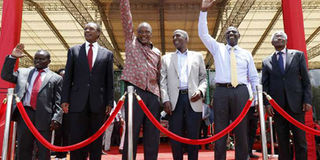Why former ICC prosecutor Ocampo left Odinga out of case

The "Ocampo Six", from right, Joshua Sang, Henry Kosgey, Uhuru Kenyatta, Ali Hussein, William Ruto and Francis Muthaura upon arrival at Afraha Stadium in Nakuru on April 16, 2016. PHOTO | FILE | NATION MEDIA GROUP
What you need to know:
- Former International Criminal Court prosecutor Moreno Ocampo had said he did not have any evidence against President Mwai Kibaki and Opposition leader Raila Odinga.
- President Uhuru Kenyatta (then deputy Prime Minister), former head of civil service Francis Muthaura, former commissioner of police Mohammed Hussein Ali, former ministers Henry Kosgey and Mr William Ruto (now Deputy President), and journalist Joshua arap Sang were accused of crimes against humanity, murder, deportation or forcible transfer of population, rape and persecution.
- Mr Ocampo’s successor, Fatou Bensouda withdrew the charges against President Kenyatta and Mr Ruto citing witness intimidation.
When on December 15, 2010 he named six people who were to be investigated for the 2007/8 post-election violence, a former International Criminal Court prosecutor had said he did not have any evidence against President Mwai Kibaki and Opposition leader Raila Odinga.
The six were President Uhuru Kenyatta (then deputy Prime Minister), former head of civil service Francis Muthaura, former commissioner of police Mohammed Hussein Ali, former ministers Henry Kosgey and Mr William Ruto (now Deputy President), and journalist Joshua arap Sang.
“We follow the evidence where it takes us. We are not taking into account political responsibilities. There are political debates, but it is not my responsibility,” Mr Moreno Ocampo had said.
The six were accused of crimes against humanity, murder, deportation or forcible transfer of population, rape and persecution.
Mr Ocampo’s successor, Fatou Bensouda withdrew the charges against President Kenyatta and Mr Ruto citing witness intimidation.
FANNING VIOLENCE
The celebrations at Afraha Stadium on April 2016 after all the cases collapsed marked a closure to the violence debate. But the President has ignited the debate, accusing Mr Odinga of fanning the violence in which an estimated 1,133 people were killed and hundreds of others forced from their homes.
For the duration of the cases until April 2016 when all the cases collapsed, names of President Kibaki and that of Mr Odinga were often brought up by supporters of the accused.
Mr Odinga and Mr Kibaki were mentioned in The Hague cases, but the prosecutor did not charge either. However, that did not stop the Kenyan post-election violence suspects from bringing up their names in the courtroom.
During the prosecution of President Kenyatta and his deputy, their lawyers had lined up video clips and media reports of Mr Odinga then calling for “three-piece voting” and “mass action”. However, the prosecution did not think that was serious enough for Mr Odinga to be charged with the violence.
Jubilee rode on the wave of the 2007-8 post-election violence cases to mobilise their supporters to vote for them in 2013.
WITNESS INTERFERENCE
As she did so, she said: “I am talking about the high level of witness interference and witness intimidation. Over half of the witnesses in the Ruto case have withdrawn or recanted their testimony. These are witnesses who had assisted the office to get these cases to confirmation stage, and the charges were confirmed against the accused persons,” she added.
In the Kenyatta case, Kenya has been referred to the Assembly of State Parties for non-cooperation with the ICC, by denying the prosecution access to speak to potential witnesses including former provincial police bosses as well as his phone and bank records during the period of the violence.
During the prosecution of President Kenyatta and his deputy, their lawyers had lined up video clips and media reports of Mr Odinga then calling for “three-piece voting” and “mass action”.
However, the Prosecution did not think that was serious enough for Mr Odinga to be charged for the violence.





